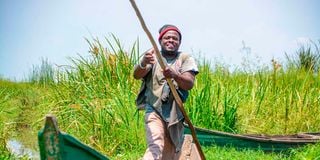From deluge to drought: Nyando residents triumph through solidarity

Ronald Ngala, a fisherman and resident of Odega village in Kisumu County, during the interview on September 19, 2024. He is part of the team that rescues residents affected by flooding.
What you need to know:
- Ugwe Primary, which is located on higher grounds, accommodates learners from Kandaria primary and secondary schools, which have remained inaccessible for more than three years.
Amid the relentless cycle of devastating floods and prolonged droughts, residents of Nyando in Kisumu County have found hope in their unwavering solidarity, a force more binding than the nature’s extremes.
Whether battling floods from the mighty River Nyando, watching Lake Victoria’s water rise or seeing their land turn to parched, cracked earth, the people of Nyando find hope in each other.
Their resilience comes not just from survival, but from the deep-rooted unity that carries them through every hardship.
When floods hit the region, it is common to see neighbours working hand in hand to rescue each other’s belongings and salvage what they can from submerged homes.
No matter how powerful forces of nature become, the community believes they cannot break the bonds they have built over generations.
“When the waters rise or the earth dries up, we stand together,” said 23-year-old Edwin Ochieng from Kodumo village.
When floodwaters rise, Mr Ochieng and other young men normally form teams to help evacuate vulnerable members of the community, including the elderly, the sick, children and those with disabilities, to safer grounds.
“We ferry people using makeshift rafts and canoes while others rescuers literally carry the vulnerable on their backs,” he told Healthy Nation.
Mr Ochieng, who has also not been spared by the raging waters, was forced to move out of his home and abandon his one acre piece of land. Currently, he lives at the nearby Odega shopping centre.
For 73-year-old Mary Atieno, she owes her life young men who took swift action and rescued her when the floodwaters caught her unawares in August 2019.
Together with her ailing husband, they were ferried to the nearby Odega shopping centre.
She only managed to carry her beddings and was lucky to be accommodated by a Good Samaritan.

Some of the homesteads that were affected by floods in Nyangande, Nyando.
“When the floods come, these young men don't think of themselves first. They come to our homes, knocking on doors, making sure we are safe,” she said.
Residents who live on higher grounds often open their homes to displaced neighbours.
In times of flooding, Musa Oredo’s modest one-and-a-half-acre piece of land is often transformed into a hub of support, where songs, prayers and stories are shared to boost morale and strengthen bonds.
At the peak of the floods, the floor of his two-roomed house gets covered in mats and blankets to shelter the distressed families.
While some have been lucky and gone back to rebuild their homes, Ms Atieno’s five-acre piece of land was totally submerged and home destroyed.
But Mr Oredo offered her a piece of land, where she has found a temporary solace in a tiny tin house together with her four grandchildren.
Due to shortage of space, she was forced to part ways with her three sons, two of whom had moved to abandoned houses belonging Lake Basin Development Authority.
Kidney disease
When Ms Atieno’s husband died in 2020 after a battle with kidney disease, Mr Oredo generously offered her a burial space.
“This was the land I had set aside for my eldest son to build his home,” he said, adding “but seeing the hardship Ms Atieno was going through moved me deeply and I knew I had to help.”
While she is happy to have found a new home, she remains deeply connected to her ancestral home, where the memories of her seven children rest beneath the soil she once walked on.
“The most cherished memories and the graves of my children are now swallowed by the vast waters of Lake Victoria.
The graves, once a place of solace and reflection, lie submerged beneath the lake’s surface as her entire land has become part of the expanding waters.
The residents also share places of worship with those churches were destroyed by the floodwaters.
Ugwe Primary School, which is on located on higher grounds, accommodates learners from Kandaria primary and secondary schools, which have remained inaccessible for more than three years.
It is not just during floods that Nyando people face the wrath of Mother Nature. Drought periods also come with their fair share of troubles.
Faced with food shortages, families do not tire to share the little food they have, ensuring that no one in the community sleeps on an empty stomach.

Red Cross staff members giving out food donations in Nyando on September 19, 2024.
Central Bwanda assistant chief Celine Oywa noted that the destruction of farmlands has forced most residents to rely on donors and well-wishers as they face an uncertain future.
“Lake Victoria backflow has completely submerged Kabuto, Kalando Ugwe and Kajulu Ugwe villages,” she said.
Among other organisations, the administrator pointed out that Red Cross, World Food Programme as well as the national and county governments have been helping the affected locals get back on their feet.
Her counterpart from Ugwe George Ogada, who has witnessed first-hand the devastating effects of the calamities, said the flooding has affected more than 450 households in his sub-location.
“My eight-acre land was affected and I am currently being hosted by a well-wisher with my eight children,” he said.
For Nyando residents, having little resources is not a hindrance to assisting those in need. It’s a system that relies on trust and generosity, with the understanding that what is shared today will come back in some other form tomorrow.





